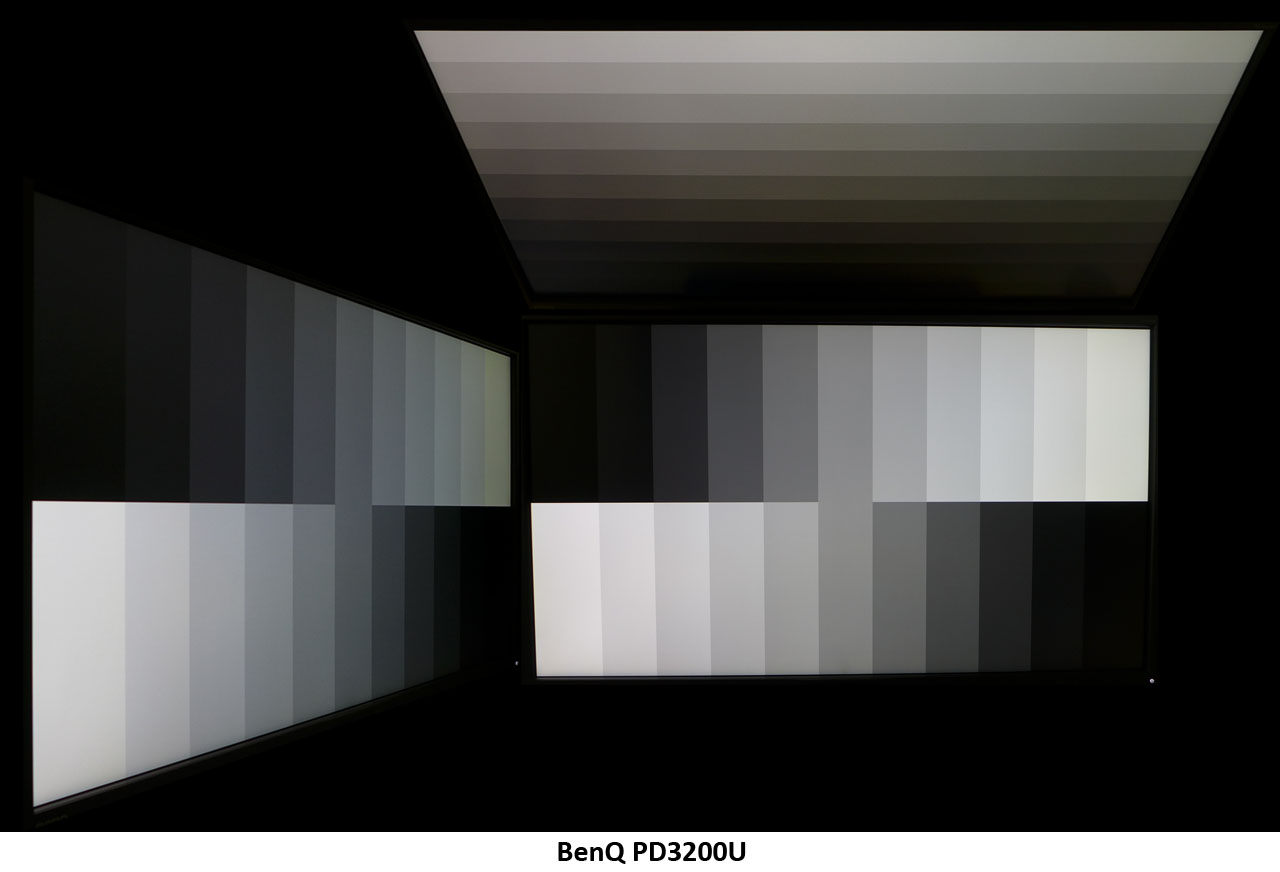BenQ PD3200U 32" Ultra HD Monitor Review
Why you can trust Tom's Hardware
Viewing Angles, Uniformity, Response & Lag
Viewing Angles
BenQ bills the PD3200U as an IPS panel, but it actually conforms to the AHVA flavor of that technology. That improves viewing angles without compromising contrast or color accuracy. You can see in the photo that the side view shows very little change in either light output or color. Whites are a tad cooler but this is about as good as it gets for any LCD. From the top, there’s obvious light falloff but detail holds up well and color shifts slightly towards red. A monitor this large almost needs the improvement that AHVA offers. Standard IPS isn’t quite as good.
Screen Uniformity
To learn how we measure screen uniformity, please click here.
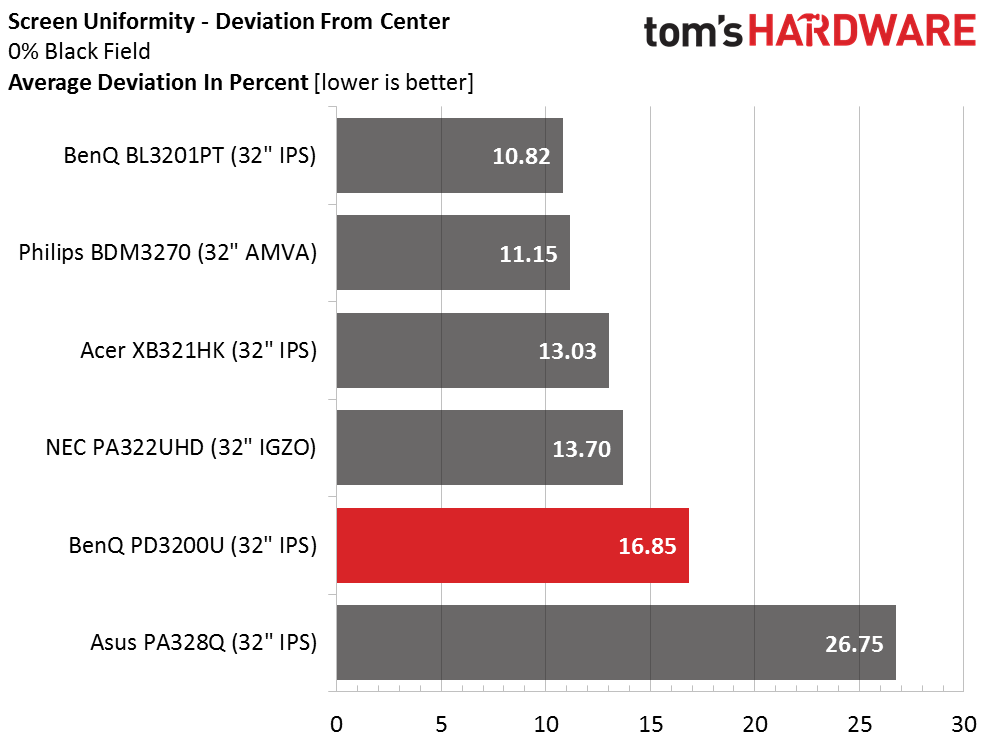
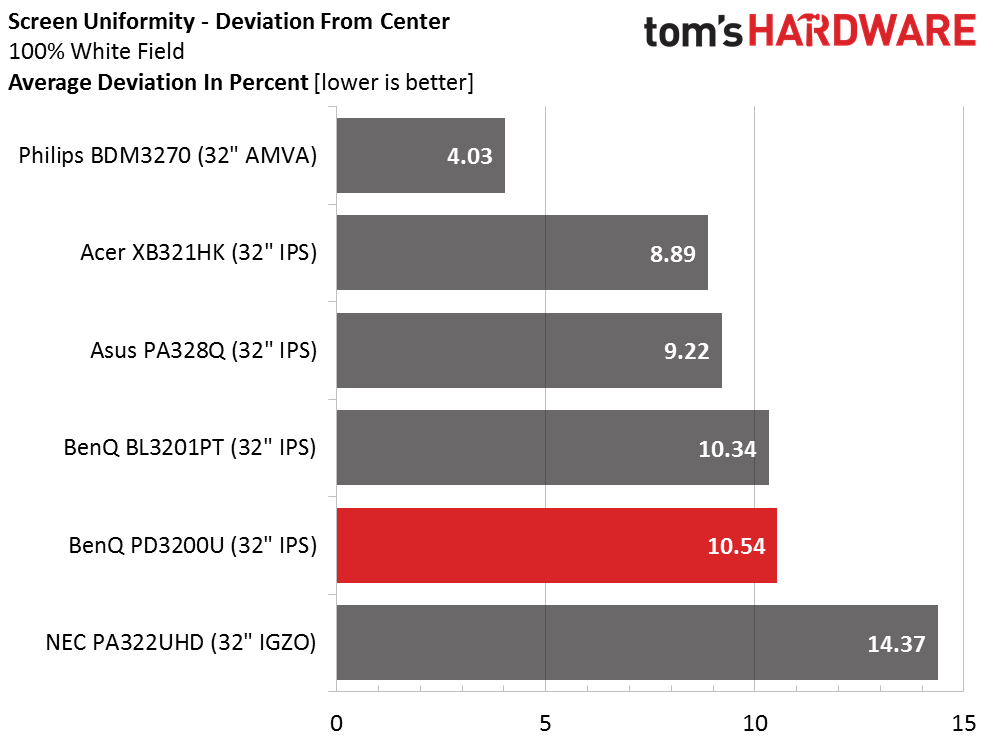
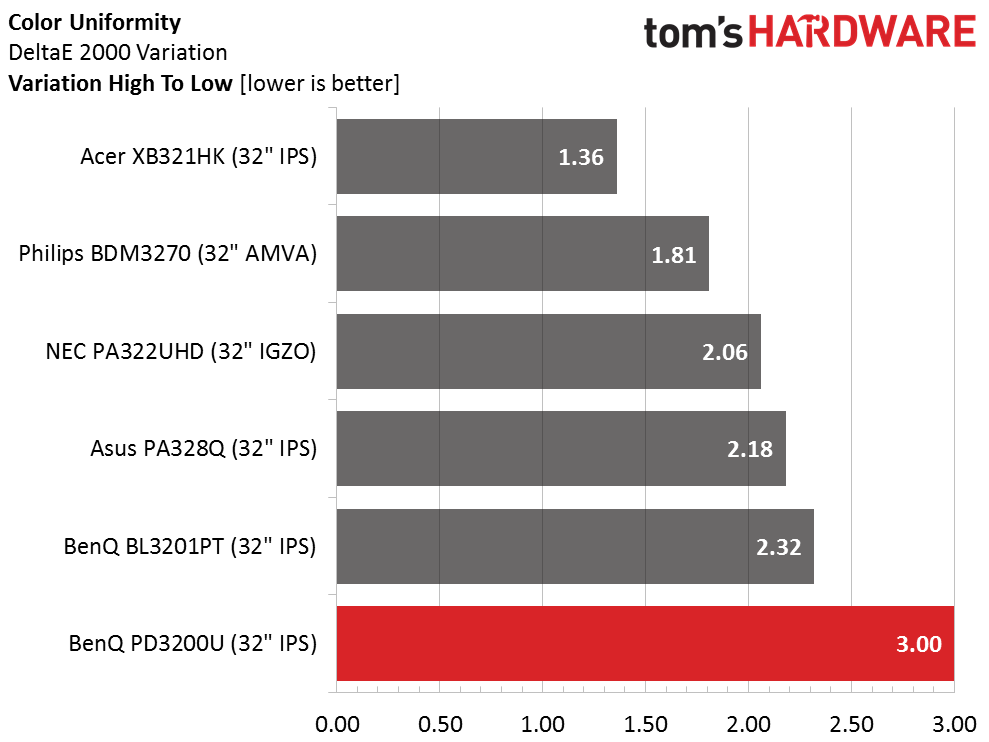
Our PD3200U sample showed slight hotspots in the corners which skewed results but didn’t mar actual content in any significant way. We’re not concerned about quality control here given our past experiences with BenQ monitors. And we wouldn’t complain about this particular one either. It’s just not quite as uniform as other screens we’ve reviewed.
The white field result is much better and shows no visible flaws. In the color uniformity test, we see a barely perceptible green tint on the right side of the screen, near the edge. The rest of the 80% field pattern looks perfect.
Pixel Response & Input Lag
Please click here to read up on our pixel response and input lag testing procedures.
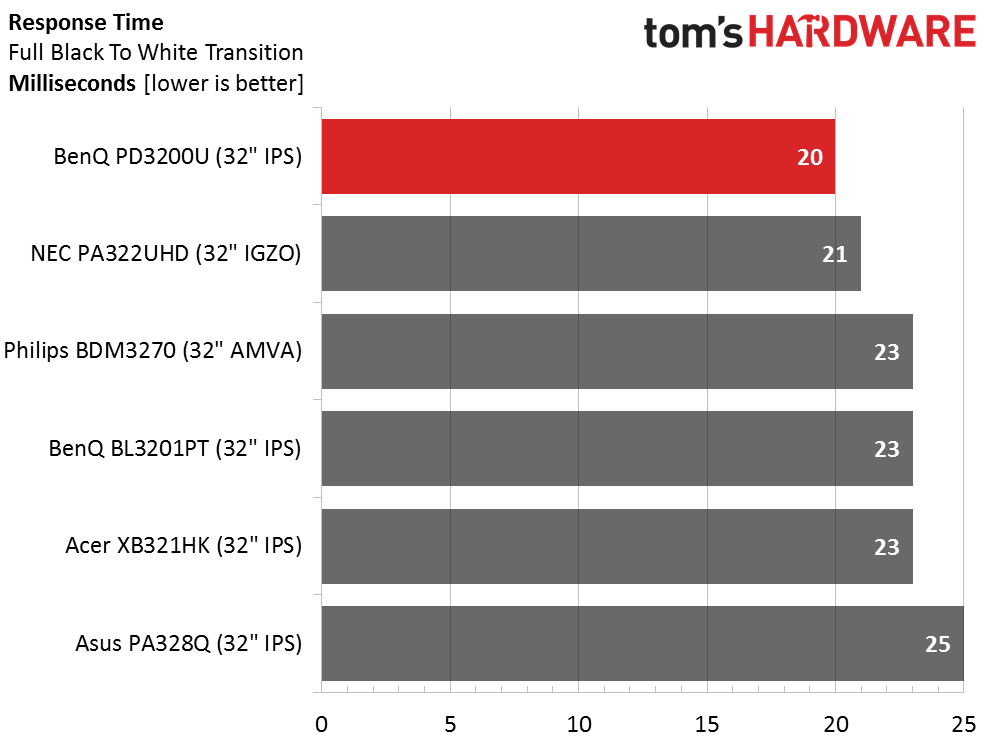
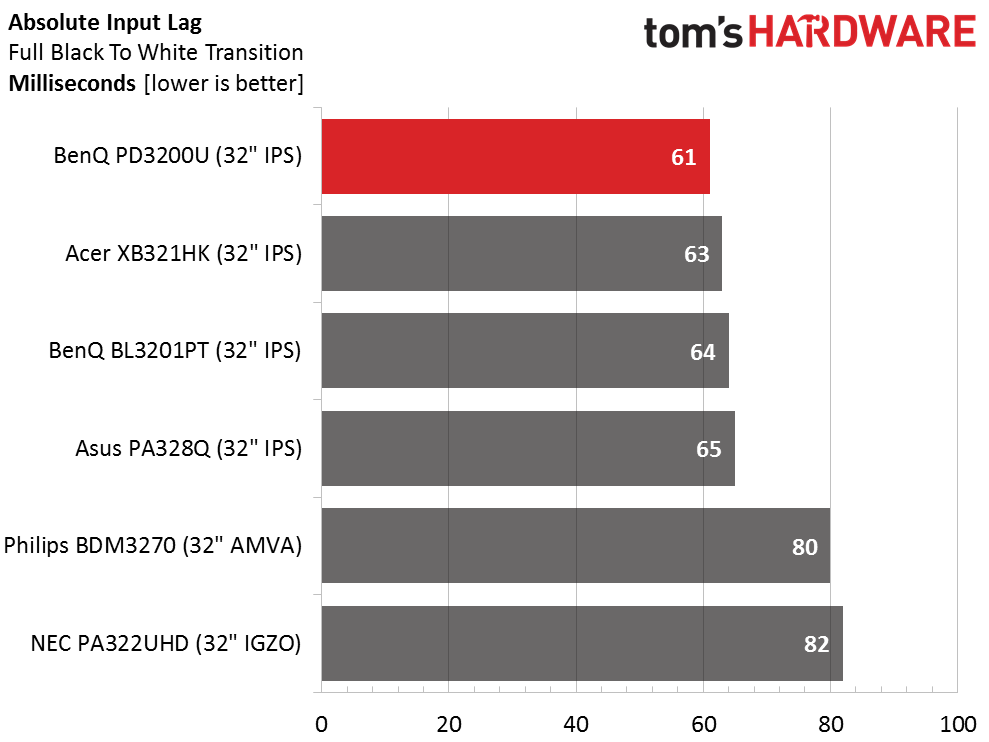
There’s nothing quite like playing games on a jumbo monitor at Ultra HD resolution, but the PD3200U’s lack of adaptive refresh will probably keep it off some enthusiasts’ short lists. Nevertheless, its response and lag scores are pretty good among present company. Even the gaming-oriented XB321HK can’t quite keep up. It offers G-Sync but adds an extra 2ms of input lag. It’s not something mortal humans will be able to discern, but if you don’t need frame-rate-matching and you’d like to save a few hundred dollars, the BenQ can anchor a gaming system admirably.
Get Tom's Hardware's best news and in-depth reviews, straight to your inbox.
Current page: Viewing Angles, Uniformity, Response & Lag
Prev Page Grayscale, Gamma & Color Next Page Conclusion
Christian Eberle is a Contributing Editor for Tom's Hardware US. He's a veteran reviewer of A/V equipment, specializing in monitors. Christian began his obsession with tech when he built his first PC in 1991, a 286 running DOS 3.0 at a blazing 12MHz. In 2006, he undertook training from the Imaging Science Foundation in video calibration and testing and thus started a passion for precise imaging that persists to this day. He is also a professional musician with a degree from the New England Conservatory as a classical bassoonist which he used to good effect as a performer with the West Point Army Band from 1987 to 2013. He enjoys watching movies and listening to high-end audio in his custom-built home theater and can be seen riding trails near his home on a race-ready ICE VTX recumbent trike. Christian enjoys the endless summer in Florida where he lives with his wife and Chihuahua and plays with orchestras around the state.
-
sparkyman215 Wow these last two monitors you've reviewed have been killer. Where was that NEC during the tests, huh ;)Reply -
Larsenexx44 I am looking at something in this screen size as UHD. Can you game on this monitor, say Far Cry 3 or Ashes of the singularity?Reply -
Realist9 Still waiting on a 32" or greater 4k monitor with g-sync and >60hz. I guess I should stop holding my breath.Reply -
Realist9 Reply19496250 said:4K at more than 60Hz requires DP1.3 or better. HDMI simply can't.
So? 1080's have DP 1.4. They have been out for almost a year, and I would think monitor vendors knew well in advance that they, and more cards with that, would be coming. So they would have had, what, 2 yrs? That's not enough?
I think the more likely cause is that monitor vendors know that it will be a while before MANY people will be able to use and want 4k at >60Hz. And they just don't think they can make $$ releasing one anytime soon.
Since the visual difference between 1080 and 1440, IMO, is not enough to warrant an upgrade, I'm stuck waiting for this "may never get here" monitor. First world problems I guess.
-
Jung I wanted to wait for 4K GSYNC >60Hz, but seems like those things aren't coming together soon, so I popped for the Acer Predator XB321HK... 2 out of three ain't bad.Reply -
VincentP Spec table in the introduction lists the panel type as AMVA (a type of vertical alignment panel). This isn't correct.Reply
BenQ lists the panel type as IPS, and this is how it is listed in performance results in this article.
The article also mentions AHVA, which is possible since this is an IPS type technology (unlike AMVA). -
JackNaylorPE Reply19497321 said:I wanted to wait for 4K GSYNC >60Hz, but seems like those things aren't coming together soon, so I popped for the Acer Predator XB321HK... 2 out of three ain't bad.
I think the more likely cause is that monitor vendors know that it will be a while before MANY people will be able to use and want 4k at >60Hz. And they just don't think they can make $$ releasing one anytime soon.
Since the visual difference between 1080 and 1440, IMO, is not enough to warrant an upgrade, I'm stuck waiting for this "may never get here" monitor. First world problems I guess.
The Asus ROG PG27UQ and the Acer Predator XB272-HDR are slated to arrive in Q2 2017, that starts tomorrow (and no, not an April Fool's joke) . That puts it some time in the next 90 days though I expect we will see them released right around the big outer shows in May.
AU Optronics AH-IPS panel, w/ 3840 x 2160 native resolution and 144Hz
Dynamic Range Support via HDR10
384-zone backlighting system
Enhance color palette via Quantum Dot filter
1000 nits of brightness (3x that of the monitor in the review)
DisplayPort 1.4 connector
HDMI 2.0a display controller (60 Hz only)
AHVA IPS Panel
And with AIB 1080 Ti's dropping this month, you will actually have something to drive it, tho it will take two of them to really make the monitor shine. Only question that as yet hasn't been answered, at least I haven't found it, is confirming ULMB support. It has G-Sync and ULMB comes with that ... in the past was no ULMB at 4k cause DP 1.2 couldn't support the high refresh rates needed for it. -
Novell SysOp fire phasers 5 time Now review the BenQ BL2711U. You can't do their 32" and neglect their 27". I don't buy the BS that 4K is better on a 32, and the 27 has 167ppi.Reply
